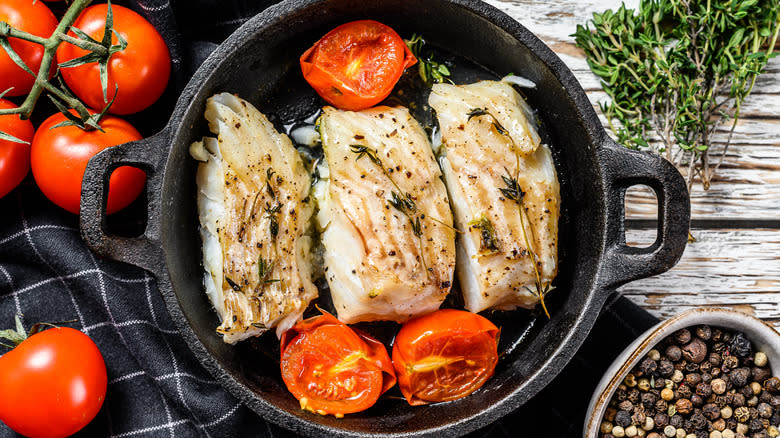Tired Of Fish Getting Stuck To Your Cast Iron Skillet? Try Thicker Cuts

Considering the countless uses of a cast iron skillet, it's understandable if you're tempted to cook nearly everything in them. If you're whipping up certain fish dishes, however, you may find the results less than ideal, particularly if the fish sticks to the pan or otherwise falls apart during cooking. Fortunately, the solution is simple: Just use thicker cuts!
While any protein can potentially stick to cast iron, fish is particularly prone because it has a lower fat content than nearly every other meat type. The best way to avoid sticking (particularly with skin-on varieties) is to let the fish sit in the skillet. When fully cooked, it will typically release itself from the pan.
Unfortunately, thinner pieces of fish can cook through quickly and may need to be flipped before the surface can naturally release; maneuvering this meat too soon can mangle delicate fish like cod or sole. That's why it's critical to use thicker cuts, like tuna, mahi-mahi, and swordfish steaks, which can stay in the pan for an appropriate amount of time and allow the exterior to release without overcooking.
Read more: Cuts Of Steak, Ranked Worst To Best
More Secrets To Top Cast Iron Fish Dishes

Sticking occurs when proteins on the surface of meat or fish react to heat by denaturing, a process that exposes more of the cells to the cast iron surface and creates chemical bonds between the pan and the food. This issue isn't as common for modern nonstick pans, which are designed with materials that minimize these potential bonds.
Some chefs may hesitate to cook fish on cast iron at all, as doing so incorrectly can lead to undesirable results — for example, if the skillet isn't thoroughly and correctly cleaned, a noticeably fishy aftertaste can infiltrate future dishes. But perhaps the biggest mistake you can make with cast iron is not using soap when cleaning, likely thanks to a common and long-running myth that it will damage or wash off your skillet's seasoning. In reality, you've got nothing to worry about if your skillet was correctly seasoned to begin with. While soaps once contained harsh substances like lye that could harm cast iron, modern soaps are much gentler on the pan's seasoning while maintaining their cleaning power.
So, with this knowledge, a properly seasoned cast iron skillet, and a proper cut of meat, you should have no qualms about cooking delicious, stick-free fish whenever you desire.
Read the original article on Mashed.

